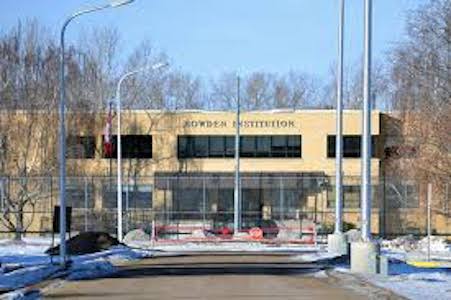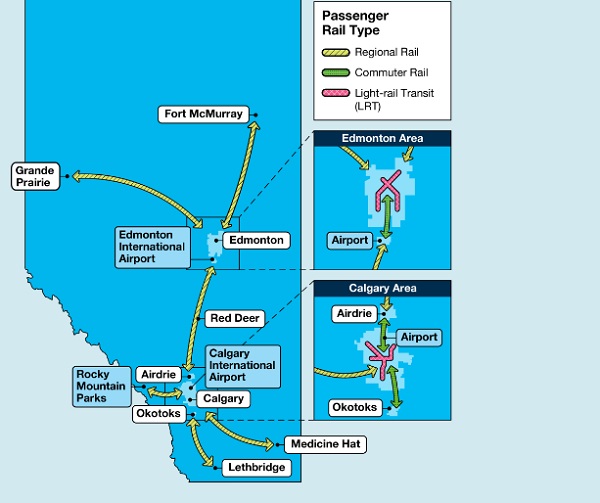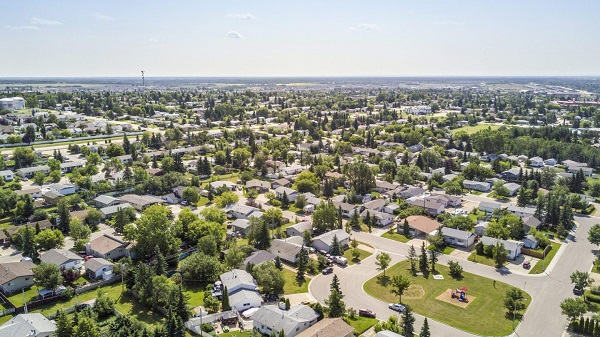Alberta
Police organized crime team takes down trafficking network supplying drugs to inmates at Bowden Institution

From ALERT – Alberta Law Enforcement Response Team
Project Evolve Dismantles Drug Trafficking Network

Eleven people have been arrested for their alleged role in a drug trafficking network, which operated in the Edmonton area and extended into the Bowden Institution.
Project Evolve was a lengthy and multi-faceted investigation led by ALERT’s Edmonton’s organized crime team, with the assistance of Correctional Service Canada, St. Albert RCMP, Morinville RCMP, Innisfail RCMP, Edmonton Police Service, and Winnipeg Police Service.
“I want to sincerely thank law enforcement for their incredible job in disrupting a significant drug trafficking network within Alberta’s correctional system,” said Kaycee Madu, Alberta Minister of Justice and Solicitor General. “ALERT has done a remarkable job partnering with federal, provincial and municipal law enforcement to remove deadly drugs like fentanyl from our prisons. This kind of organized criminal activity has no place in the correctional system.”
A total of 60 criminal charges have been laid against 11 suspects allegedly involved in trafficking drugs in the Edmonton area. ALERT alleges the network conspired to smuggle drugs into the prison system and had established connections to Bowden Institution.
Project Evolve resulted in the seizure of drugs and cash worth an estimated $300,000. Search warrants were executed at homes in St. Albert and Edmonton, with the following evidence being seized:
- 35 grams of fentanyl;
- 88 grams of methamphetamine;
- 620 grams of cocaine;
- 1,341 grams of a cocaine buffing agent;
- 1,745 grams of cannabis;
- a handgun with its serial number removed; and
- $206,000 cash.



“This was a very well-organized, well-coordinated group. Their drug activities jeopardized community safety and hurt communities big and small,” said Staff Sgt. Blayne Eliuk, ALERT Edmonton. “And by introducing drugs into the prison system, this substantially put the health and safety of not only inmates, but also corrections staff and officers, at risk.”
“Organized crime groups who traffic in illicit drugs destroy lives, homes and communities. Drugs and drug addiction contribute to spinoff crimes such as theft and break-and-enters, which result in citizens feeling less safe. Investigations such as this are a positive step towards reducing crime in St. Albert and keeping the community safe,” added Const. M-J Burroughs, St. Albert RCMP.
“I’d like to thank ALERT and my team at Bowden Institution for their combined efforts on Project Evolve. Partnerships such as this one between ALERT and Correctional Service Canada demonstrate intergovernmental departments working together to keep Canadians safe,” said Lawrence Hartigan, Warden of Bowden Institution.
Project Evolve concluded on December 17, 2020, with several arrests:
- David Klassen, a 31-year-old man, currently incarcerated;
- Nicolas Moores, a 29-year-old man from Edmonton;
- Garreth Curry-McCallum, a 23-year-old man from St. Albert;
- Jesse Riedlhuber, a 23-year-old man from Morinville;
- Brendan Baer, a 23-year-old man from St. Albert;
- Tyler Kemps, a 25-year-old man from Edmonton;
- Nolan Arndt, a 24-year-old man from St. Albert;
- Tyler Willimont, a 24-year-old man from Edmonton;
- Jessa Brianne Ivicak, a 23-year-old woman from Edmonton;
- Kolby Gordon, a 23-year-old man from St. Albert; and
- Chayce Anthony Krause, a 26-year-old man, currently incarcerated.
Both Klassen and Krause were incarcerated at Bowden Institution during the course of the investigation. Moores is currently serving a federal sentence under the jurisdiction of the Correctional Service Canada as the result of a conviction from a previous and unrelated ALERT investigation.
A full list of charges is available for download here.
Project Evolve began in June 2019.
Members of the public who suspect drug or gang activity in their community can call local police, or contact Crime Stoppers at 1-800-222-TIPS (8477). Crime Stoppers is always anonymous.
ALERT was established and is funded by the Alberta Government and is a compilation of the province’s most sophisticated law enforcement resources committed to tackling serious and organized crime.
Alberta
Passenger rail experts from across the world to inform Alberta’s Passenger Rail Master Plan

Alberta’s future runs on rails
Alberta’s government is bringing together passenger rail experts from across the world to share best practices and inform the province’s Passenger Rail Master Plan.
As Alberta experiences record growth and evolving transportation needs, passenger rail infrastructure and services will be vital for enhancing accessibility and connecting communities. To support this, Alberta’s government is developing a Passenger Rail Master Plan to build the optimal passenger rail system for the province.
As part of the development of the plan, Alberta’s government is hosting a one-day forum to provide an opportunity for Alberta communities, industry and experts to collaborate and share information on passenger rail opportunities and challenges. The forum includes experts from Ontario, Quebec, California, Italy, Spain and Japan who are involved in passenger rail procurement, governance and operations. The sessions will allow for the sharing of best practices and lessons learned on passenger rail planning and development.
“Alberta was built by innovators and visionaries who saw potential in our province and its people. They believed that if you could dream it, you could achieve it. We believe there is opportunity and demand for passenger rail services in Alberta. Today’s forum marks an important step forward in the development of our Passenger Rail Master Plan and in achieving our vision for passenger rail.”
In line with the province’s commitment to engaging Albertans throughout the development of the Passenger Rail Master Plan, a survey has been launched to seek public input on passenger rail. Albertans are invited to complete the online survey by Dec. 20 to help shape the future of passenger rail in Alberta. There will be additional opportunities for Albertans to have their say on passenger rail in the future, including regional open houses which will be held in early 2025.
“Feedback from Albertans, Alberta municipalities, Indigenous communities and industry will be critically important to developing passenger rail services in Alberta. I encourage all Albertans to complete the online survey to help inform a shared vision for passenger rail to enhance accessibility, efficiency, and connectivity across the province.”
In April 2024, Alberta’s government shared its vision for passenger rail and announced the development of the Passenger Rail Master Plan for Alberta. The province’s vision is for an Alberta passenger rail system that includes public, private or hybrid passenger rail, including:
- a commuter rail system for the Calgary area that connects surrounding communities and the Calgary International Airport to downtown
- a commuter rail system for the Edmonton area that connects surrounding communities and the Edmonton International Airport to downtown
- passenger rail that runs between Calgary and Edmonton and the Rocky Mountain parks
- a regional rail line between Calgary and Edmonton, with a local transit hub in Red Deer
- municipal-led LRT systems in Calgary and Edmonton that integrate with the provincial passenger rail system
- rail hubs serving the major cities that would provide linkages between a commuter rail system, regional rail routes and municipal-led mass transit systems
The vision includes a province-led “Metrolinx-like” Crown corporation with a mandate to develop the infrastructure and oversee daily operations, fare collection/booking systems, system maintenance, and planning for future system expansion.
Quick facts
- The Passenger Rail Survey will be open until Dec. 20.
- Alberta’s Passenger Rail Master Plan is expected to be completed by summer 2025 and will include:
- a comprehensive feasibility assessment
- financial and delivery model options
- governance and operations recommendations
- a 15-year delivery plan
- public engagement
Related information
Alberta
REPORT: Alberta municipalities hit with $37 million carbon tax tab in 2023

Grande Prairie. Getty Images photo
From the Canadian Energy Centre
Federal cash grab driving costs for local governments, driving up property taxes
New data shows the painful economic impact of the federal carbon tax on municipalities.
Municipalities in Alberta paid out more than $37 million in federal carbon taxes in 2023, based on a recent survey commissioned by Alberta Municipal Affairs, with data provided to the Canadian Energy Centre.
About $760,000 of that came from the City of Grande Prairie. In a statement, Mayor Jackie Clayton said “if the carbon tax were removed, City property taxes could be reduced by 0.6 per cent, providing direct financial relief to residents and businesses in Grande Prairie.”
Conducted in October, the survey asked municipal districts, towns and cities in Alberta to disclose the amount of carbon tax paid out for the heating and electrifying of municipal assets and fuel for fleet vehicles.
With these funds, Alberta municipalities could have hired 7,789 high school students at $15 per hour last year with the amount paid to Ottawa.
The cost on municipalities includes:
Lloydminster: $422,248
Calgary: $1,230,300 (estimate)
Medicine Hat: $876,237
Lethbridge: $1,398,000 (estimate)
Grande Prairie: $757,562
Crowsnest Pass: $71,100
Red Deer: $1,495,945
Bonnyville: $19,484
Hinton: $66,829
Several municipalities also noted substantial indirect costs from the carbon tax, including higher rates from vendors that serve the municipality – like gravel truck drivers and road repair providers – passing increased fuel prices onto local governments.
The rising price for materials and goods like traffic lights, steel, lumber and cement, due to higher transportation costs are also hitting the bottom line for local governments.
The City of Grande Prairie paid out $89 million in goods and services in 2023, and the indirect costs of the carbon tax “have had an inflationary impact on those expenses” in addition to the direct costs of the tax.
In her press conference announcing Alberta’s challenge to the federal carbon tax on Oct. 29, 2024, Premier Danielle Smith addressed the pressures the carbon tax places on municipal bottom lines.
“In 2023 alone, the City of Calgary could have hired an additional 112 police officers or firefighters for the amount they sent to Ottawa for the carbon tax,” she said.
In a statement issued on Oct. 7, 2024, Ontario Conservative MP Ryan Williams, shadow minister for international trade, said this issue is nationwide.
“In Belleville, Ontario, the impact of the carbon tax is particularly notable. The city faces an extra $410,000 annually in costs – a burden that directly translates to an increase of 0.37 per cent on residents’ property tax bills.”
There is no rebate yet provided on retail carbon pricing for towns, cities and counties.
In October, the council in Belleville passed a motion asking the federal government to return in full all carbon taxes paid by municipalities in Canada.
The unaltered reproduction of this content is free of charge with attribution to the Canadian Energy Centre.
-

 Brownstone Institute1 day ago
Brownstone Institute1 day agoThe Most Devastating Report So Far
-

 Economy2 days ago
Economy2 days agoCOP 29 leaders demand over a $1 trillion a year in climate reparations from ‘wealthy’ nations. They don’t deserve a nickel.
-

 Censorship Industrial Complex1 day ago
Censorship Industrial Complex1 day agoAnother Mass Grave?
-

 ESG11 hours ago
ESG11 hours agoCan’t afford Rent? Groceries for your kids? Trudeau says suck it up and pay the tax!
-

 Alberta1 day ago
Alberta1 day agoMAiD In Alberta: Province surveying Albertans about assisted suicide policies
-

 Energy1 day ago
Energy1 day agoOttawa’s proposed emission cap lacks any solid scientific or economic rationale
-

 Alberta1 day ago
Alberta1 day agoOn gender, Alberta is following the science
-

 International12 hours ago
International12 hours agoElon Musk praises families on X: ‘We should teach fear of childlessness,’ not pregnancy



